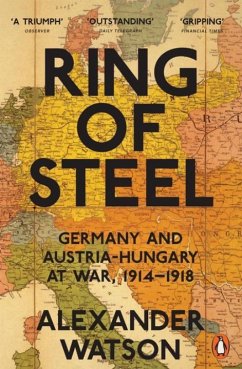
The German 1918 Offensives
A Case Study in The Operational Level of War
Versandkostenfrei!
Versandfertig in 6-10 Tagen
49,99 €
inkl. MwSt.
Weitere Ausgaben:

PAYBACK Punkte
25 °P sammeln!
This is the first study of the Ludendorff Offensives of 1918 based extensively on key German records presumed to be lost forever after Potsdam was bombed in 1944.In 1997, David T. Zabecki discovered translated copies of these files in a collection of old instructional material at the U.S. Army Command and General Staff College at Fort Leavenworth, Kansas. He presents his findings here for the first time, with a thorough review of the surviving original operational plans and orders, to offer a wealth of fresh insights to the German Offensives of 1918.David T. Zabecki clearly demonstrates how th...
This is the first study of the Ludendorff Offensives of 1918 based extensively on key German records presumed to be lost forever after Potsdam was bombed in 1944.
In 1997, David T. Zabecki discovered translated copies of these files in a collection of old instructional material at the U.S. Army Command and General Staff College at Fort Leavenworth, Kansas. He presents his findings here for the first time, with a thorough review of the surviving original operational plans and orders, to offer a wealth of fresh insights to the German Offensives of 1918.
David T. Zabecki clearly demonstrates how the German failure to exploit the vulnerabilities in the BEF's rail system led to the failure of the first two offensives, and how inadequacies in the German rail system determined the outcome of the last three offensives. This is a window into the mind of the German General Staff of World War I, with thorough analysis of the German planning and decision making processes during the execution of battles. This is also the first study in English or in German to analyze the specifics of the aborted Operation HAGEN plan. This is also the first study of the 1918 Offensives to focus on the 'operational level of war' and on the body of military activity known as 'the operational art', rather than on the conventional tactical or strategic levels.
This book will be of great interest to all students of World War I, the German Army and of strategic studies and military theory in general.
In 1997, David T. Zabecki discovered translated copies of these files in a collection of old instructional material at the U.S. Army Command and General Staff College at Fort Leavenworth, Kansas. He presents his findings here for the first time, with a thorough review of the surviving original operational plans and orders, to offer a wealth of fresh insights to the German Offensives of 1918.
David T. Zabecki clearly demonstrates how the German failure to exploit the vulnerabilities in the BEF's rail system led to the failure of the first two offensives, and how inadequacies in the German rail system determined the outcome of the last three offensives. This is a window into the mind of the German General Staff of World War I, with thorough analysis of the German planning and decision making processes during the execution of battles. This is also the first study in English or in German to analyze the specifics of the aborted Operation HAGEN plan. This is also the first study of the 1918 Offensives to focus on the 'operational level of war' and on the body of military activity known as 'the operational art', rather than on the conventional tactical or strategic levels.
This book will be of great interest to all students of World War I, the German Army and of strategic studies and military theory in general.














